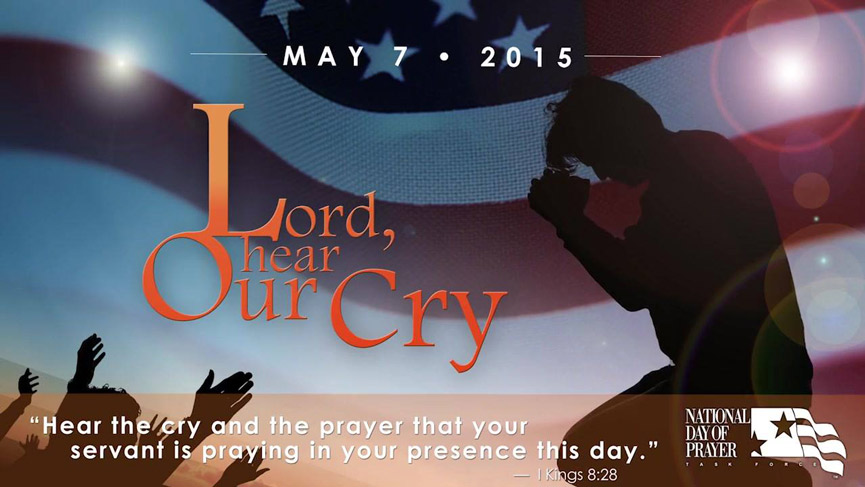 Christians across the country will be gathering today in observance of the 64th annual National Day of Prayer, the theme of which this year is “Lord, Hear Our Cry.”
Christians across the country will be gathering today in observance of the 64th annual National Day of Prayer, the theme of which this year is “Lord, Hear Our Cry.”
The theme comes from I Kings 8:28, which states, “Hear the cry and the prayer that Your servant is praying in Your presence this day,” and serves as a rallying cry to Christians to intercede for the spiritual and physical needs of the nation.
“This [year’s observance] will have profound significance for our nation,” John Bornschein, National Day of Prayer (NDP) Task Force Vice Chairman, told reporters. “By crying out together in prayer, we have an unprecedented opportunity to see the Lord’s healing and renewing power made manifest as we call upon citizens to humbly come before His throne.”
In Washington, D.C., Dr. Jack Graham, pastor of the 40,000 member Prestonwood Baptist Church in Plano, Texas, whose services are featured on the television broadcast “PowerPoint,” will deliver the keynote address at the Cannon House Office Building. Other speakers include Rep. Robert Aderholt, Rep. Louie Gohmert, Senate Chaplain Barry Black, District of Columbia Judge Robert Rigsby and Christian filmmaker Alex Kendrick.
“May [our churches] become places were we worship You instead of entertain each other,” prayed Dr. Glenn Sheppard of International Prayer Ministries at a men’s prayer breakfast in D.C. this morning. “We acknowledge that we have been wicked. We ask that you would purify our pulpits [and] purify the tables of conversation of our families…”
Other gatherings will be held in cities across America at city halls, courthouses and local churches.
“This annual observance powerfully demonstrates the religious freedoms that were secured by our Founding Fathers who recognized that our innate human rights are inexorably tied to our relationship with the Creator,” commented Shirley Dobson, Chairman of the National Day of Prayer (NDP) Task Force.
“It’s my heartfelt prayer that this year’s theme, ‘Lord, Hear Our Cry,’ will prompt our fellow citizens to turn to God in reverence and humility,” she said.
Throughout America’s early history, a number of the Founding Fathers issued proclamations calling inhabitants to prayer, including in 1798, when President John Adams proclaimed a national day of humiliation, prayer and fasting.
“As the safety and prosperity of nations ultimately and essentially depend on the protection and blessing of Almighty God, and the national acknowledgment of this truth is not only an indispensable duty which the people owe to Him,” he wrote, “…this duty, at all times incumbent, is so especially in seasons of difficulty and of danger, when existing or threatening calamities—the just judgments of God against prevalent iniquity—are a loud call to repentance and reformation.”
President Abraham Lincoln also proclaimed a National Fast Day in 1863.
“[I]t is the duty of nations as well as of men to own their dependence upon the overruling power of God, to confess their sins and transgressions in humble sorrow, yet with assured hope that genuine repentance will lead to mercy and pardon; and to recognize the sublime truth, announced in the Holy Scriptures and proven by all history, that those nations only are blessed whose God is the Lord,” his proclamation read.
“[I]nsomuch we know that by His Divine law, nations like individuals are subjected to punishments and chastisements in this world, may we not justly fear that the awful calamity of civil war, which now desolates the land, may be but a punishment inflicted upon us for our presumptuous sins, to the needful end of our national reformation as a whole people,” Lincoln said.
Editor’s Note: To learn about a National Day of Prayer gathering near you, click here.
Become a Christian News Network Supporter...


